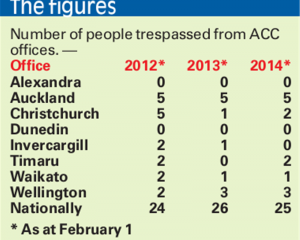National signalled long before the general election last year that the accident compensation scheme was in its sights.
It can be no surprise, then, that ACC's annual report tabled in Parliament last week, showing a loss of $4.8 billion following a $2.4 billion loss for the year before, provides a convenient moment for the Government to consent to much higher levies and to promise further reforms.
But statements that the scheme is "financially unsustainable" need to be viewed with scepticism. That might be true if nothing was done to change the way ACC is funded. The gap between its assets and liabilities has been affected by lower investment returns during the recession, but these will recover.
There have also been book- keeping changes. Of greater concern is the growth of future liabilities, from $9.4 billion to $23.8 billion in four years, and a good deal of the responsibility for widened and costly coverage can be laid at the door of the Clark government.
An example is the physiotherapy benefit, which for most clients meant treatment was mostly without charge. Only in August this year did ACC decide to reduce from next month the subsidy paid to practitioners, saying the costs were "unaffordable for levy payers".
According to the Government, the subsidy introduced by Labour in 2004 and budgeted to cost $9 million a year had by this year risen to $139 million and was projected to rise to $225 million by 2011-12, with no equivalent rise in rehabilitation rates.
It has quoted other examples of how the scheme has developed far beyond its original concept to cover diseases like leptospirosis and brucellosis and medical conditions like asthma, when, it argues, these should instead be paid for out of Vote Health.
To these might be added trauma of various kinds suffered by victims and perpetrators resulting not from accidents but from criminal acts, mental injury arising from workplace trauma, and sports injuries.
When it began with the 1972 Accident Compensation Act, only those who were employed were entitled to claim for workplace accidents. That soon changed to cover all accidents, including motor vehicle accidents, regardless how injury occurred.
The principle of lump-sum compensation for permanent disability was established, along with earnings-related benefits for accident victims while they recovered. In 1992, a National government imposed more stringent constraints: a greater emphasis on rehabilitation was required, along with an expansion of funding to levy all persons in employment.
Six years later, National removed ACC's monopoly rights, only for these to be restored when Labour came into power in 1999. Labour, intent on increasing the "take-up" of ACC benefits, also reintroduced lump-sum payments in 2002. Since 2004, in fact, Labour's additions to the scope of the scheme have added $537 million to ACC's liability.
Clearly, though, some matters are beyond the control of the corporation: the increasing number of claimants due to the ageing population, greater injury rates, costly medical advances which allow people disabled by serious injury to live longer, and rising wage costs for doctors and nurses. Increasing levies is but a short-term response to these problems.
In political terms, the Government has been overstating ACC's problems in order to justify higher levies and to promote its case for partial privatisation. It could re-open the employers' account to competition, although employers have shown little enthusiasm.
It could do something about improving the scheme's deteriorating performance in rehabilitation, which affects its long-term liabilities. Yet the greatest liabilities (other than those resulting from accounting changes) are caused by the estimated long-term cost of treatment for existing claimants, but which will not become due for some time and which, supposedly, are to be met by the corporation's substantial reserves.
The Government has long signalled levy rises to meet the 1999 decision to ensure the scheme is fully funded by 2014, that purpose being to produce sufficient reserves to cover the lifetime costs of all existing injuries - but it is likely now to extend the deadline to 2019, as had intended the Clark government.
Whatever further changes and entitlement reductions the Government makes to ACC, it stands to suffer grave political risks if by so doing the core purposes and strengths of the no-fault compensation scheme are threatened. Considerable care will be required.





